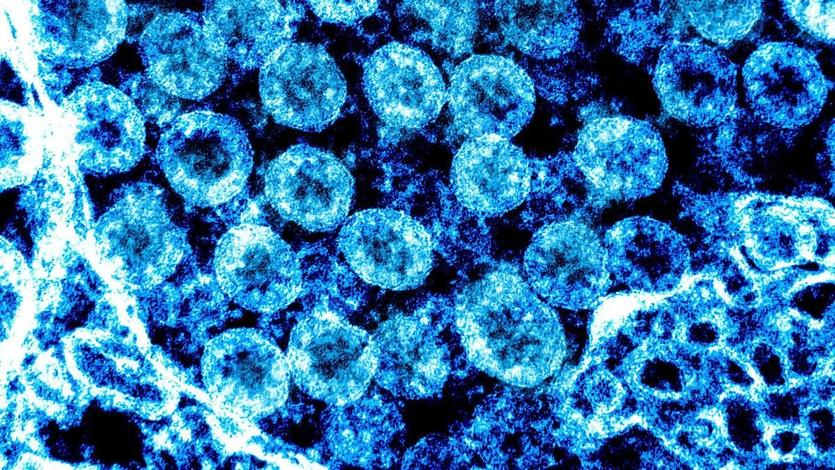Researchers give short shrift to politically motivated theories on COVID-19 origin
 This undated handout photo by the National Institute of Allergy and Infectious Diseases of the US National Institutes of Health, obtained on Aug 1, 2021, shows a transmission electron color-enhanced micrograph of SARS-CoV-2 virus particles isolated from a patient. (NATIONAL INSTITUTES OF HEALTH / NATIONAL INSTITUTE OF ALLERGY AND INFECTIOUS DISEASES / AFP)
This undated handout photo by the National Institute of Allergy and Infectious Diseases of the US National Institutes of Health, obtained on Aug 1, 2021, shows a transmission electron color-enhanced micrograph of SARS-CoV-2 virus particles isolated from a patient. (NATIONAL INSTITUTES OF HEALTH / NATIONAL INSTITUTE OF ALLERGY AND INFECTIOUS DISEASES / AFP)
Scientists approached by China Daily would not be drawn on the politicization of COVID-19 and insist any investigation into the origins of the virus that causes the disease should be based on science.
International voices are increasing for an objective investigation while some political forces have been fixated on political manipulation and the blame game.
Ian Mackay, virologist and associate professor with the faculty of medicine at the University of Queensland, said: "I don't see how any investigation will yield anything that isn't already known. This feels like theater to me."
A joint origin-tracing study earlier this year by more than 30 experts from the World Health Organization and China ended with a report concluding that a laboratory-leak scenario was extremely unlikely.
Mackay added that in time the origins of COVID-19 will be found.
"It will take a lot more sampling of the wildlife coronavirome, genetic sequencing and virus culture to characterize many more of the coronaviruses that inhabit animals other than us, all over the world. That's where I believe we will find the likeliest culprit," he said.
Stuart Turville, an associate professor in the Immunovirology and Pathogenesis Program at the University of New South Wales' Kirby Institute, said the origins of the virus that causes COVID-19, or any virus for that matter, is "very complex".
"We need to step back from the political conversation and look at the science and based on the evidence the virus did come from an animal, most likely an animal reservoir that links the transmission from bat to human."
Australian virologist Danielle Anderson, who worked at the Wuhan Institute of Virology's Biosafety Level 4 lab until November 2019, has rejected claims about the virus leak hypothesis from the lab.
Some intelligence sources in the United States have been cited by US media to question the lab's safety and alleged its scientists were engaged in contentious gain-of-function research that manipulated viruses in a manner that could have made these more dangerous. None of these claims has ever been substantiated.
Distorted information
Distorted information has obscured an accurate accounting of the lab's functions and activities, which were more routine than how they've been portrayed in the media, Anderson said in an interview with Bloomberg.
Anderson, a leading expert on bat-borne viruses, said no one she knew at the Wuhan institute was ill toward the end of 2019. Moreover, there is a procedure for reporting symptoms that correspond with the pathogens handled in high-risk containment labs.
"If people were sick, I assume that I would have been sick-and I wasn't," she said. "I was tested for coronavirus in Singapore before I was vaccinated, and had never had it."
Not only that, many of Anderson's collaborators in Wuhan came to Singapore at the end of December 2019 for a gathering that discussed the Nipah virus. There was no word of any illness sweeping the laboratory, she said.
Sadly, Anderson's account has been largely ignored even by her own government.
Peter Collignon, of the Australian National University's Medical School and one of the country's leading experts on infectious diseases, said: "We still don't know how the COVID-19 outbreak started and its origins.
"It's seems to be a bat virus that has adapted to be very effective at human transmission."


